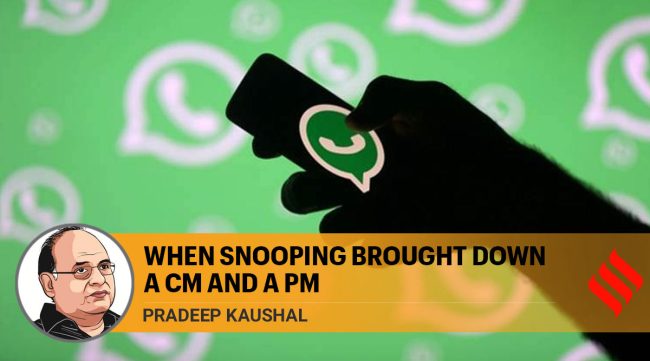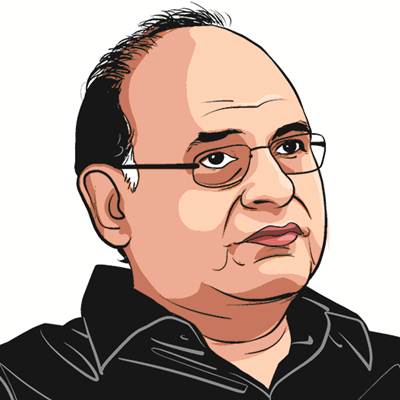Opinion History Headline: When snooping brought down a CM and a PM
The recent WhatsApp row and the storm it has kicked up in political corridors — while the Opposition alleged that the government had a role in the snooping, the latter brought up the “bugging” of then finance minister Pranab Mukherjee’s office during the UPA regime in 2011 — is only another version of this cloak-and-dagger drama that’s old hat for Indian politicians.

 The recent WhatsApp row and the storm it has kicked up in political corridors.
The recent WhatsApp row and the storm it has kicked up in political corridors.
As allegations of illegal phone-tapping rock the Karnataka Assembly, with the CBI investigation revealing that police were snooping in on several public figures in the state, it’s déjà vu all over again for politics in India. The recent WhatsApp row and the storm it has kicked up in political corridors — while the Opposition alleged that the government had a role in the snooping, the latter brought up the “bugging” of then finance minister Pranab Mukherjee’s office during the UPA regime in 2011 — is only another version of this cloak-and-dagger drama that’s old hat for Indian politicians.
Flash back to the heady days of the late 1980s, when Rajiv Gandhi, once hailed as ‘Mr Clean’ by the media, was on the decline. And Ramakrishna Hegde, the charismatic Janata Party chief minister of Karnataka, was in the ascendant, widely seen as a potential prime ministerial candidate from the non-Congress camp. His two consecutive victories in the 1983 and 1985 Assembly elections in Karnataka had alarmed all his rivals in the Janata Party, who also nursed prime ministerial ambitions.
In 1988, media reports surfaced to the effect that Veerappa Moily, then leader of Opposition in the Karnataka Assembly, was trying to lure some ruling Janata Party MLAs to the Congress. The reports were based on some tape-recordings. Moily, instead of being apologetic for what was clearly an act of political impropriety, came out all outraged that he had been subjected to snooping.
With Hegde’s detractors, particularly Subramanian Swamy, moving forward to politically ambush him, the allegation followed that Hegde had ordered the tapping of telephones of 51 politicians in Karnataka. The Indian Telegraph Act, 1885, empowered the Home Secretary to permit the Deputy Inspector General of Police (Intelligence) of the state concerned to intercept telephonic conversations of certain categories of people. Hegde’s response was one of complete denial. “I practise value-based politics,” he famously underlined.
Hegde failed to realise that the other side was well prepared to take the matter to a conclusive end. The issue came up in Parliament, with Union Minister of Communications Bir Bahadur Singh announcing that some 50 telephone numbers had been tapped in Karnataka. He cited evidence, including orders signed by the DIG (Intelligence), for tapping telephones of people, to back his assertion.
On August 10, 1988, Hegde tendered his resignation and was succeeded by his party colleague S R Bommai. The political objective realised, everybody gave up on the issue. Though it did not mark the end of Hegde’s political career, he ceased being a front-runner for the top job.
Three years later, in March 1991, allegations of snooping resulted in another casualty, triggering the collapse of the Congress-backed Chandra Shekhar government at the Centre, barely four months after it had assumed office.
The allegation that former prime minister Rajiv Gandhi was being spied upon by a couple of Haryana policemen was as bizarre as the arrangement of a 64-member breakaway faction of the Janata Dal enjoying power with the outside support of the 197-member Congress.
On March 2, 1991, the minders of Rajiv Gandhi caught two men, Prem Singh and Raj Singh, from a roadside spot close to 10, Janpath. They were sipping tea hawked by a small-time vendor, when some people suddenly descended on the scene and forcibly took them away. Dressed in plainclothes, the men confessed to being Haryana CID personnel. According to Haryana’s political folklore, Rajiv Gandhi was tipped off by Ranjit Singh, younger brother and rival of then Haryana chief minister Om Prakash Chautala, who was among leading lights of Chandra Shekhar’s Samajwadi Janata Party (Rashtriya).
That was reason enough for Rajiv Gandhi to pull the rug from under Chandra Shekhar’s feet.
The latter tried reaching out to the former to dispel all his misgivings, but in vain. Gandhi was insistent upon Chandra Shekhar’s resignation. Left with no choice, Chandra Shekhar put in his papers four days later, on March 6, 1991.
As in the Hegde case, no one showed any interest in getting to the bottom of the snooping charge against the Haryana policemen. It was never disclosed, if at all, who had ordered them to spy on Rajiv Gandhi. And also, what information the two men had gathered or could possibly gather by standing in a bylane of 10, Janpath.




